#adventure module
Explore tagged Tumblr posts
Text
We just uploaded some emergency fixes for all of our official Eureka: Investigative Urban Fantasy adventure modules. You can download them at these links.

#eureka: investigative urban fantasy#rpg#ttrpg#eureka#indie ttrpg#ttrpg community#ttrpg tumblr#ttrpgs#tabletop#eureka ttrpg#urban fantasy#adventure module#game master#dungeon master#oil rig#angel#arcade#horror#mystery
33 notes
·
View notes
Text
Dragon Rot Rat King
Around a month ago, I scheduled an rpg session with only vague ideas of what I would run. My game No Nut November: Squirrels of the Post-Apocalypse got floated as an idea, so I started thinking about what I could do as a one-shot. There were two published adventures for NNN, one by me and the other by Sprinting Owl; I love both very much, but they were too much for a one-shot. So, I reached for my stash of OSR adventures.
I landed on A Rat King’s Realm from JunkyardTornado, a tight tangle of horrible tunnels wrapped around a showdown with a rat king beneath the bones of a dragon. I loved the horror in the tunnels and the set-piece at the center. Rats are prominent antagonists in NNN already, so it felt like a natural conversion. I ended up doing an extensive reskinning of the adventure to fit the Fallout-but-rodents vibes of NNN and really loving how it turned out!
I had my players delve into the guts of a ruined Ohey (human) facility where the skeleton of an Ohey flying machine disintegrated under the weight of time and the paws of scavengers. The tunnels were full of rats, but also:
A buzzclack (robot) that thinks it’s a rat
Strange slimy experiments
Anti-rodent traps
And more!
We ended up with only time to explore a couple of rat nests (the first almost killed them, so the clever use of an explosive was employed for the second), sniff around a couple of rooms, and finally take on the rat king, winning the fight by dropping scaffolding on its head. Only one player was very familiar with OSR play (the other two, most recently, have been in a Never Stop Blowing Up campaign with me which is a very different vibe), so they learned the consequences of recklessness in an OSR dungeon and how to apply their wits to the situation as they played.
I’m really pleased to have two first-party adventures out for No Nut November: Squirrels of the Post-Apocalypse. Want to connect Against the Insufferable Bears and Dragon Rot Rat King? Thunder probably knows about an old Ohey facility out in the desert.
--Daily
#ttrpg#indie ttrpg#ttrpg design#ttrpg dev#roleplaying games#osr#squirrels of the post-apocalypse#adventure module
4 notes
·
View notes
Text
MacGuffin heist module dev log(? I guess that's what I'm calling these sorts of posts) now available.
6 notes
·
View notes
Text
Review of "Hamlet of Volage," Adventure Module V1 from BRW Games for Adventures Dark and Deep.

I love printed gaming materials. I adore published modules that have a distinct old-school look. If I see such modules being offered, I generally purchase them, for my own collection and to support small publishers. They usually don't cost too much.
Modules with witches, fae, conspiracies and/or cults are another selling point for me.
Case in point: I purchased each of the V series modules by BRW games before they were published in print, so I got each as a PDF with the printed book to be sent later when completed. The stories revolve around different covens of witches, existing in secret(naturally) and warring among themselves.
Take the incredibly small hamlet of Volage. At least one coven exists here, most of them living normal, public lives, while members of other covens either live within, or visit frequently, to keep tabs, act as spies and everything you'd expect of such a scenario.
As I'm running this module for a system that we're play testing for publication by Penny Thought Exchange, and this happens to be an anthro based system based loosely on our Steal This Game! public domain engine, I ran the module as "The Hamlet of Vole Lodge: The Haunting of Pell House." None of these kinds of changes affected the module's play too much. Since characters are animal based, they do have access to abilities that run of the mill PCs in other games might not, but we try to balance these abilities as a part of character creation. Also, the NPCs, including the baddies, get these also, so it levels out. Otherwise, it's largely cosmetic, as NPCs are assigned an animal type and fitting description.
Because the module has so many NPCs and information on the town, I printed these out and affixed them to standard paper sized cardboard for quick reference. It also made it easier to track my own additions, such as what animal types the various NPCs are.
All that said to prepare for the review proper, I have to give one last bit of insight. I was running for a very small group, and certain among them are known to get frustrated quickly if leads and clues aren't given to them easily or frequently enough. Thus, I'm not sure in certain places where the problem may lay with the module or with the sensibilities of certain individuals, though in at least one case the problem is certainly the module's, as I will describe as we continue.
Within a day or so in the hamlet, there was already grumbling that nothing was turning up of any real interest. Most of the supernatural occurences, as the PCs felt, were rather mundane, unprovable, or non sequitur to their investigations. Blankets getting bedbugs and such seemed normal enough. Sheep being attacked by wolves and then vanishing is a bit odd, but not enough to jump to suspicions of witchcraft, and seemingly not enough to investigate at any rate. The module itself didn't suggest or describe any methods of doing so or anything learned if PCs did, but it wasn't relevant since they were disinterested in doing so. Every cat being found dead was more mystifying but another case of "what are we supposed to do about it?" People getting sick, people falling off ladders, all seemed like a typical string of unfortunate but not distinctly magical occurances.
They decided to spend the night in the cemetery, where only one random event took place, a weird fog or mist which I tried to play up as much as I could. When all was said and done, however, it was more of the same: "Weird, but nothing we can learn anything from and seemingly unrelated."
The group decided that after another day or so if they didn't come across something of more interest they were going to bail. I still had two more modules and they were ready to quit before getting more than a day into the first. I ended up throwing in a clue not in the module to keep them in, though I regretted throwing bones like that simply because the PCs became disinterested. Still, I really wanted to continue the module, so I did so. To some degree, two of them, but the details of those aren't very important.
They decided to keep an eye on some of the young ones of the hamlet who had been rumored to run off into the woods some nights, and follow them.
Around this time, I decided to look into the next module. It shouldn't be necessary. Each were published at different times, and are supposed to be playable independently. Yet the second module gives details of great importance: the way the Pell family is butchered. V1 simply says they were killed violently. The second reveals that the attack has the hallmarks of an animal attack, yet they got into the house at night, somehow, and left without being seen. Now that gives some serious indication of some supernatural going's on. Too bad V1 decided we didn't need to know!
After telling the players about this new info, they became much more convinced of supernatural tomfoolery, but still felt about the same as they did - follow the young ones next time they run off, if that doesn't lead to anything, we leave.
I don't believe the module tells you what night the young witches go to their esbat, but an NPC suggested the night of the new moon, so the PCs kept special notice that night. One of the bones I threw in to keep the adventure going.
In the end, they got noticed while trailing the girls, but the witches pretended not to notice. They completed their esbat, getting new familiars and other boons before revealing their awareness of the PCs.
The battle didn't last long. The PCs got destroyed. However, it was a small group, and my suggestions of getting retainers and mercenaries to boost their numbers fell on deaf ears. I do not fault the module for their loss whatsoever.
At the moment, I'm running my own revision of an old adventure I wrote(I shared a little taster of it a bit ago), but afterwards, I hope to jump to V2 and see how that one goes. If it works out well, on to V3, or perhaps my sequel idea to the module I'm rewriting now, and then V3. If V2 goes poorly, I suspect I will abandon the series and leave them to look pretty on my shelf.
If you like OSR adventure modules, despite my less than stellar success, you can't go too wrong for a $4 PDF. https://preview.drivethrurpg.com/en/product/373537/Adventure-Module-V1--The-Hamlet-of-Volage
Addendum: While looking for a quick cover image to put at the beginning of the review, I came across tenfootpole's review. I often agree, sometimes strongly disagree, but generally find their reviews entertaining either way. Looking to see if they hailed it as a masterpiece and realize I'm a big dummy, oh boy did they not find it impressive. Strong language warning for those sensitive to that kinda thing. Their agreement does not make me right, but I'm gratified that at least it wasn't just me who was kind of bewildered by a lot of the adventure.
#osr#D&D#AD&D#adventures dark and deep#adventure module#adventure module v1#the hamlet of volage#osr module#adventure review#module review#osr module review#brw games#rpg#rpgs
5 notes
·
View notes
Text
So a good chunk of you might know me for my VTM content, but I’m also a huge fan of D&D 5E. As a creative writer whose ideas tend to multiply like rabbits, I’ve always wanted to write an adventure for it.
Well…
I DID IT!!!
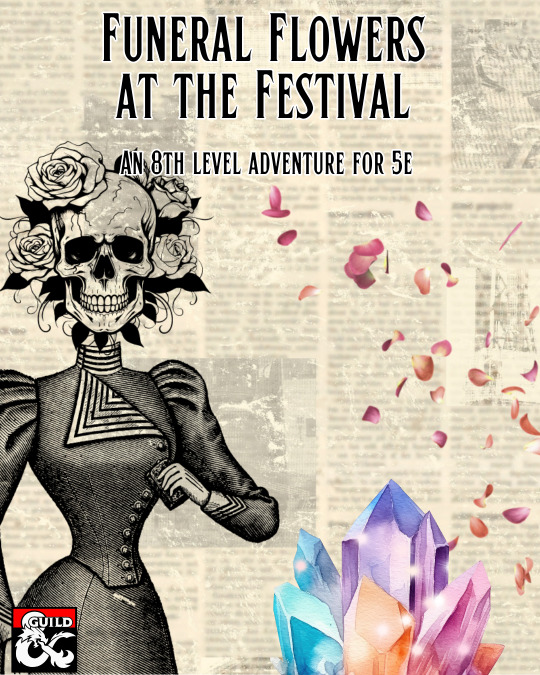
I’m proud to present to you Funeral Flowers at The Festival, a 5e adventure for players of 8th level. If you love mysteries, horticulture, and horror, this one’s for you! Trigger warnings are included on the first page or so of the PDF preview. Granted, this is my first attempt at creating one of these, so it’s not perfect, but I’m happy with it nonetheless. If you do decide to pick up a copy, I’d love it if you could review so I could hear your thoughts. Feel free to shoot me a message on here as well! Here’s the link.
Many thanks to the folks over at TTRPG University for their amazing course, and my amazing classmates who also created their own wonderful projects!
To all my fellow VTM fans, I hope to write for the World of Darkness in the future, so don’t you fret. And as always, thank you for sticking by me 🥰
#ttrpgs#dnd#dnd 5e campaign#dms guild#adventure module#fang formulas#publishing#writing#self publishing#self publication#dungeons and dungeons#thank u#mystery#thriller#horror
8 notes
·
View notes
Text
~Out in the Cold~
A Perilous, High-Altitude Dungeon Crawl
Lying within the easternmost caverns of Mt. Khabadkar, caressed by each dawn’s light, Nimbus Village reveled in the beauty of the Sun as it carved through the gloom of the darkest clouds; an ever-present beacon of hope and warmth in their lives.
For the past decade and change, however, the Cloud Layer has found itself tragically devoid of Nimbus’ warming light.
Ransacked by a powerful vampire and claimed as her own, what remains the village is unrecognizable from the community that once called it home, with legions of frozen dead claiming all who brave too close in the name of their despotic master.
Player Level: Level 9 to 10.
Party Size: 4 to 6 adventurers.
Difficulty: Tactician.
Starting Gear: Standard starting gear/funds, one Rare magic item, two Uncommon magic items, 1d10*500 gp.
Setting: Spireveil (High-Magic Industrial Fantasy).
Contents: The following adventure contains potentially distressing content, including, but is not limited to the following: Body Horror, Cultural Appropriation, Cult Worship, Extreme Heights, Governmental Corruption, Human Trafficking, Imprisonment, Manipulation, Mass Murder, Mild Cannibalism, Organized Crime, Possible Animal Death.
1 note
·
View note
Text

Mark Taormino's Dark Wizard Games is currently running a Kickstarter for four (!) D&D adventure modules (actually 8 total with separate editions for 1E and 5E rules) with one having cover art by Jeff Dee. Become a backer like me before time tuns out.
1 note
·
View note
Text






























Dungeons and Dragons adventure modules (1980s)
#dungeons and dragons#d&d art#d&d game adventure module#d&d campaign#80s fantasy art#keith parkinson#larry elmore#jeff easley#clyde caldwell#cover art#d&d character#tsr hobbies inc#1980s#1982#1987
1K notes
·
View notes
Text
MUTANT: Elysium - Biomechatronics
🎲 Embrace cutting-edge technology with character biomechatronics in MUTANT: Elysium tabletop RPG. Enhance your abilities in the post-apocalyptic world! #MUTANTElysium #TabletopRPG #FreeLeaguePublishing #TTRPG #RPG
MUTANT: Year Zero – [PDF]MUTANT: Elysium – [PDF] Embrace cutting-edge technology with character biomechatronics in MUTANT: Elysium tabletop RPG. Enhance your abilities in the post-apocalyptic world! Experience the post-apocalyptic world of MUTANT: Elysium, the tabletop RPG by Free League Publishing. Set in the same universe as MUTANT: Year Zero, this gripping roleplaying game plunges players into…

View On WordPress
#Adventure module#Board Game#Campaign guide#Character Creation#dice rolling#Elysium lore#Elysium setting#Faction politics#free league#free league publishing#gaming#Intrigue and mystery#Judicator role#mutant elysium#Mutant Year Zero#Mutant Year Zero RPG#Mutant Year Zero universe#pen and paper#post-apocalyptic#Post-human world#roleplaying game#RPG rules#storytelling#Survival gameplay#tabletop gaming#tabletop RPG
0 notes
Text
In the original The Island of Doctor Moreau, the doctor surgically turns a puma into a woman over the course of the text until in the climax of the book the puma-woman escapes and mauls Moreau to death before dying from her wounds. In the spring 2019 Literature/Film Quarterly, University of Arkansas professor Kristen Figgins wrote "In Wells’s text, the puma is thus symbolic of nature’s retribution against Moreau; she is the wild animal that resists domestication and both her pain and triumph are focal points for all of the Beast Folk as they shift from the pain of Moreau’s dominion to a return to a more natural state."
And then every American movie adaptation of The Island of Doctor Moreau has included a sexy panther-woman who Moreau variously treats as a daughter/pet/lab rat who's always perfectly obedient and demure to the doctor.



It's also a recurring trope that the doctor actively encourages her to fuck the male protagonist because of Science Reasons.
I didn't know about any of this until earlier this month and frankly "Every time the entertainment industry adapts this book the symbol of nature that cannot be tamed or domesticated by man is turned into a sexy lady who has been tamed and domesticated by man" is so on the nose it sounds like satire
#horror#the island of doctor moreau#i found out about this by reading an old ravenloft adventure module#based on the island of doctor moreau#in which the doctor has a sexy DOLPHIN-woman assistant#who is explicitly in the adventure only so she can be a love interest for one of the players
300 notes
·
View notes
Text
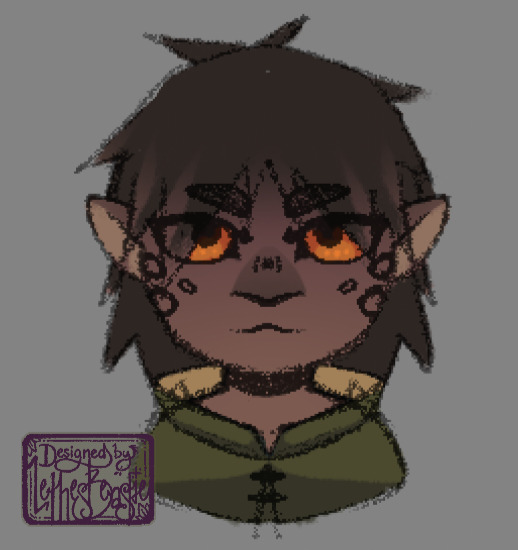



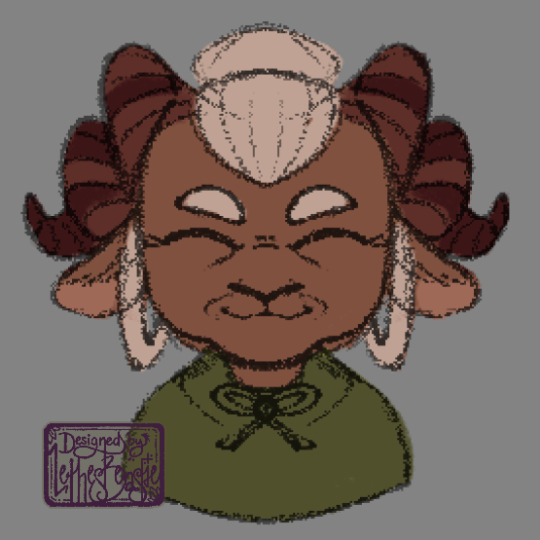




Realized I never posted the character designs I made for the recent dnd oneshot I ran! It was my first time as a DM, and I had a ton of fun! I'm thinking about trying to make the story into some sort of pre-made oneshot package if anyone would be interested in a horror-mystery pirate ship adventure :3

Bonus art of my girl Belladonna who didn't get much spotlight due to time constraints <3 I love my depressed necromancer firbolg
#Waters Rising#Wake of the Wanderer#dnd#dnd art#i made more characters than i needed to because i wanted my players to have a lot of options to choose from#since we were running it as a premade module style adventure#ended up having four players and they were absolutely phenomenal to work with#considering offering little chibi headshot commissions once school is out cause these were very fun akfhskfhsjd
121 notes
·
View notes
Text

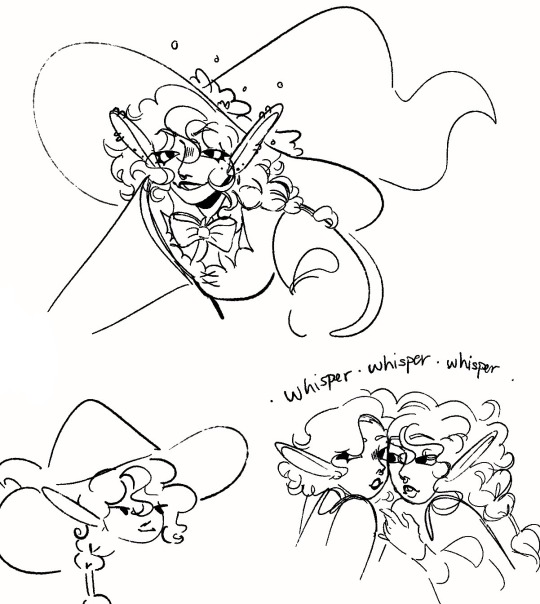
been thinking about taz recently
#and by thinking about it i mean im dming the entire taz module#I LOVE THE ADVENTURE ZONE#taz#taako#taako taaco#taako from tv#taako fanart#taako adventurezone#taz taako#taako taz#lup taaco#lup taz#lup adventurezone#taz balance#the adventure zone balance
273 notes
·
View notes
Text
quite satisfied with how much i've been improving with my chain dashes. if you ignore all the blunt force trauma and fall-related injuries.
#sometimes the zoomies go too hard and you drift into another zip code. you know how it is.#hyper light drifter#spark's drifter adventures#spark talks about nothing of relevance#nooooooot looking forward to these next few bosses. i hate having three hp man hanged man kicked my ass so hard#alt has been fun other that that though! going quicker than i thought but i'm still enjoying it :) think i memorized most module locations#anyways. dash dash dashdashdashdashdashdashdashdash💥#judgement can't catch any part of me except thESE HANDS I'M SCHMOOVING
22 notes
·
View notes
Text
Drow and Drider Adventure Kickstarter Went Live
The Kickstarter for "After the Fall", the sequel to "Rise of the Drow", went live today. It's a 5e evil campaign where you play drow or drider. For those who've followed me for my Throne of Night and Way of the Wicked entries, this might just be up your alley.
I was very lucky to get to be part of this project, and am proud of the work that I put into this. When it comes out, I'll be looking forward to finally seeing all the other chapters that other people worked on and seeing this campaign as a whole.
Depending on demand and stretch goals achieved, AAW Games is looking to convert this to Pathfinder 2e as well.

#d&d#dungeons and dragons#dnd#dungeons & dragons#d20#roleplaying game#d&d 5e#ttrpg#dnd 5e#drow#adventures#module#adventure path#aaw games#wotc#underdark#underground campaign#drow campaign#drider#kickstarter#evil campaign#rise of the drow#dungeons and dragons 5e
10 notes
·
View notes
Text

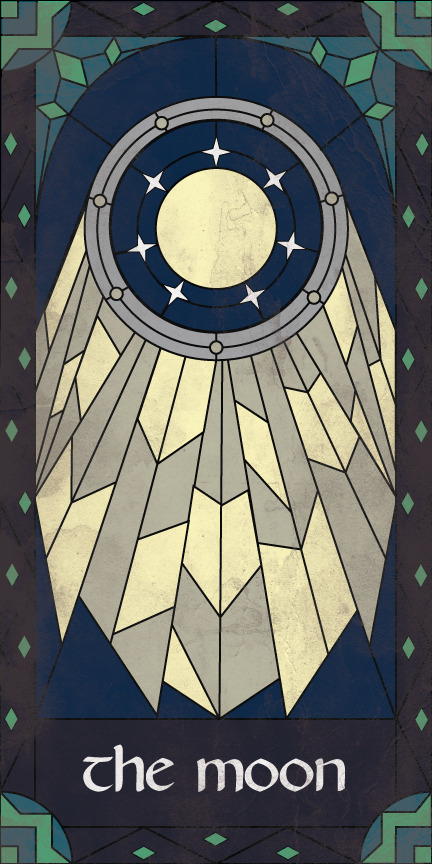

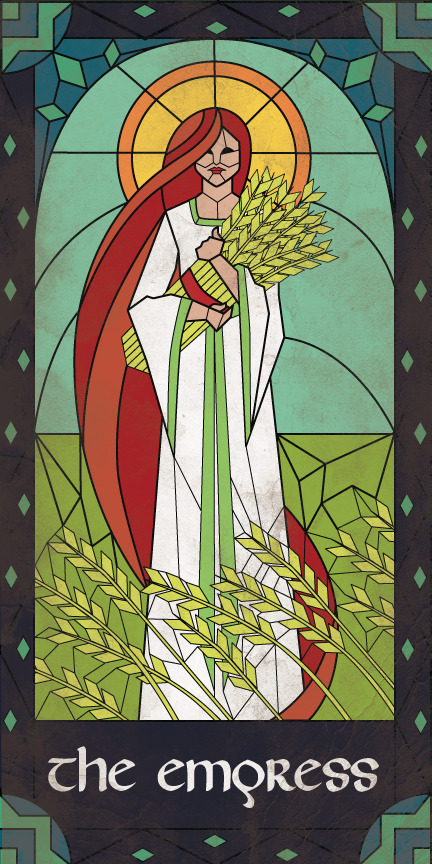
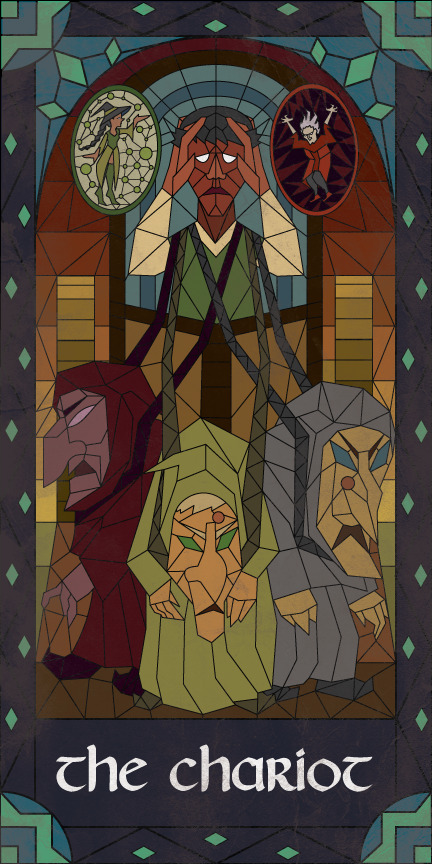
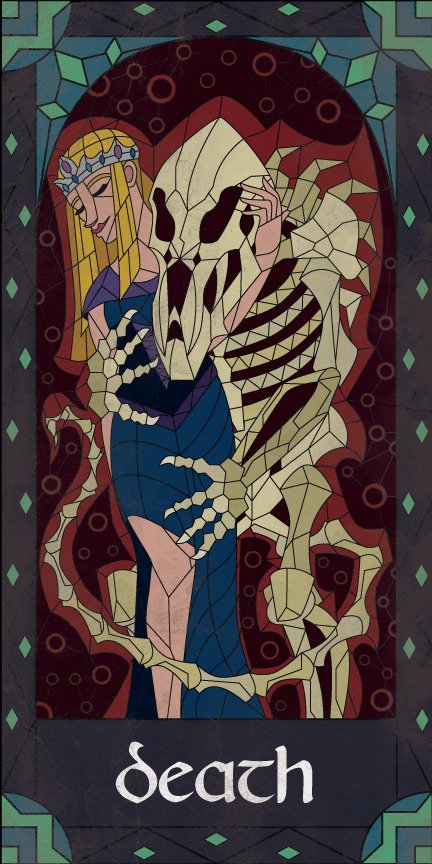
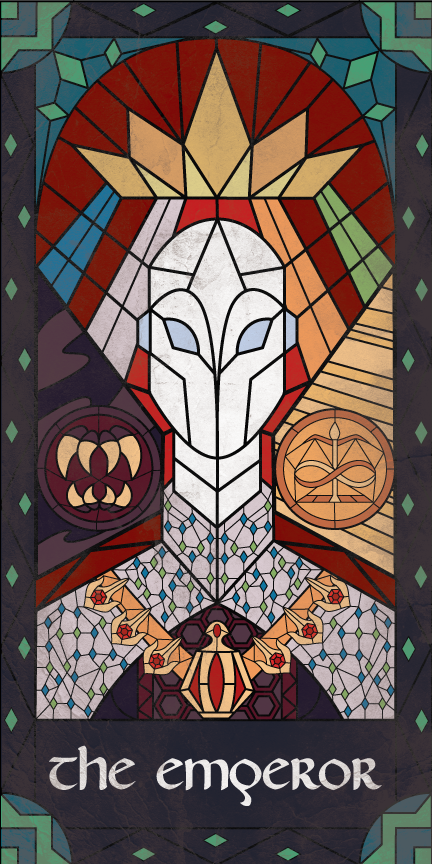


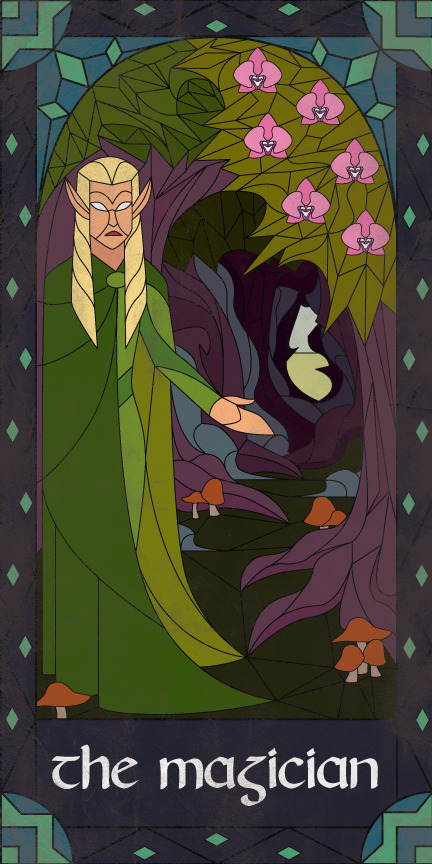



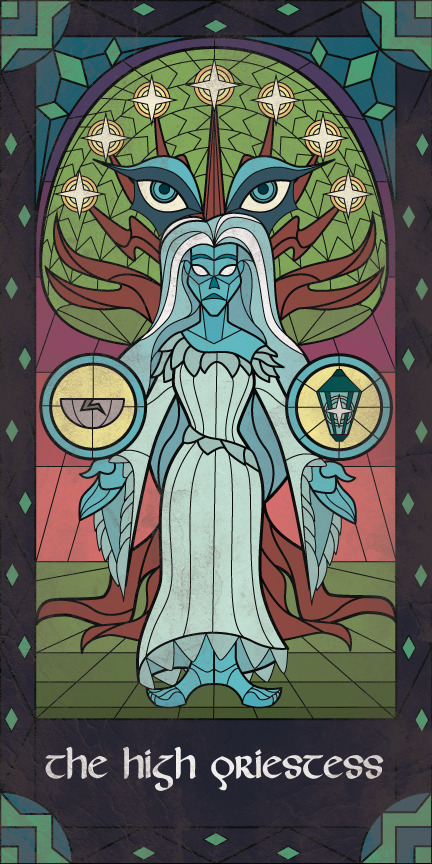
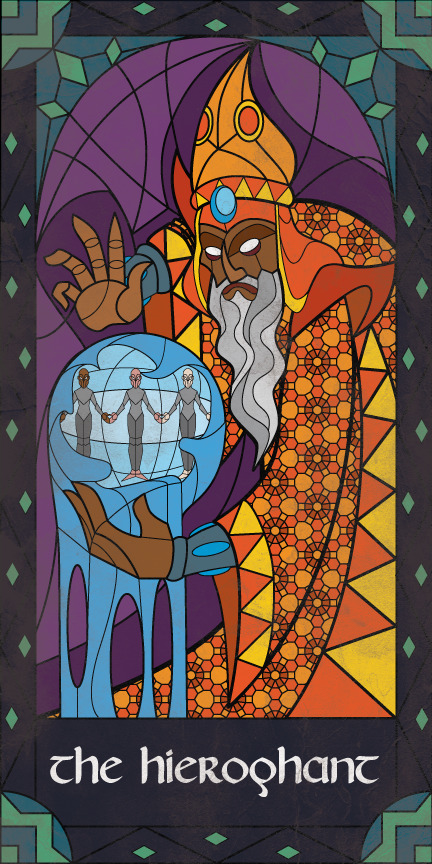
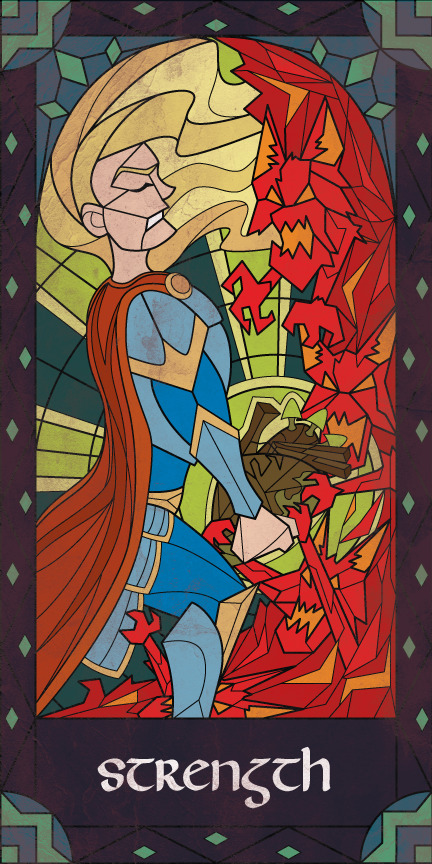

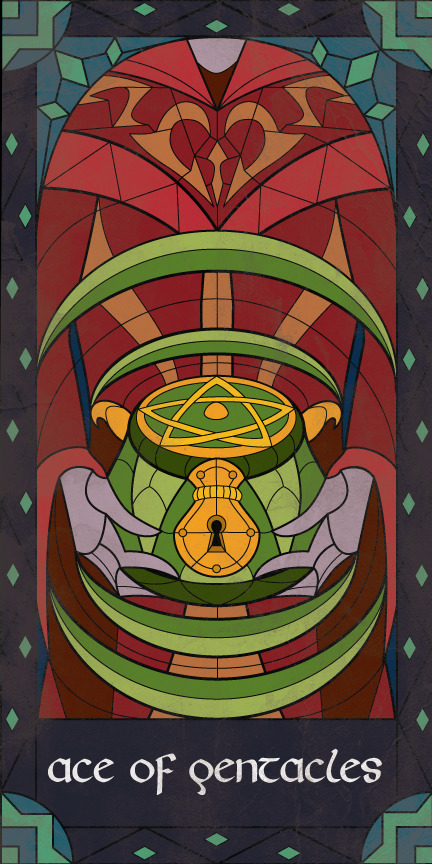
I was talking with a friend the other day and she was telling me about how my old DnD module Tarot art was something she still loved, and I genuinely forgot all about it haha. I realized I never put it all in one place so, I thought I would make a post. I made these when I was right out of college and getting into the DnD gaming scene at a local gamestore, and a couple of DMs were writing a set of modules themed around Tarot/The Deck of many things, and they very kindly commissioned me to make some artwork for that. This was probably my first real commission project I ever did, it was a good learning experience, and I enjoyed the creative back and forth with the DMs brainstorming ideas of how to represent the content of the adventure in the cards :) I don't recall if they ever finished the story completely, but their adventures are still up on DM's Guild for anyone curious [X]
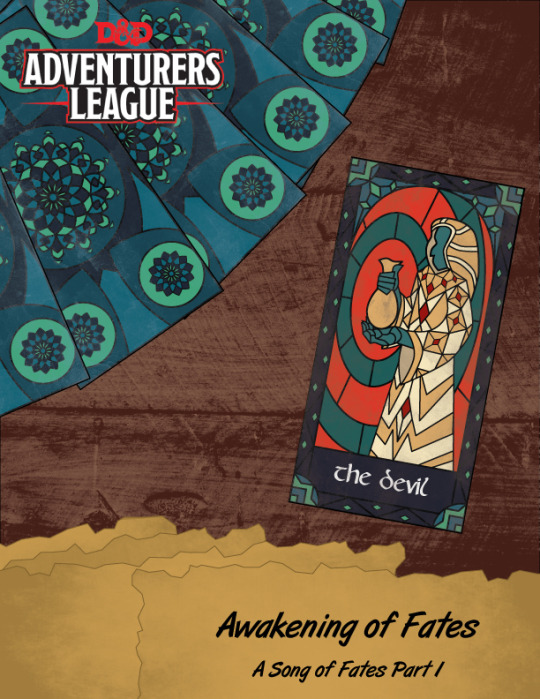
#dnd#tarot#deck of many things#vector art#dnd adventurers league#dnd module#oh god here comes the part where i tag all the cards#the devil#the moon#the lovers#the empress#the chariot#death tarot#the emperor#the tower#the hanged man#the magician#the star#justice#temperance#the high priestess#the hierophant#strength#judgment#ace of pentacles#a song of fates#those tags are mostly for me but#if you happen to stumble across this and like it cool
20 notes
·
View notes
Text
List of TTRPG dev things I want to do before the year is out
- Finish the first draft of Shattered Neon
- Make the other 3 one-shots for Shattered Neon to include in the download for the system
- Get to starting to write the two other ttrpgs I want to make (they will not be done for a while but getting started is the hard bit besides focusing on just one)
- make a EUREKA Adventure module LIVE so people can actually see how to do it, warts and all.
- Start an in-person ttrpg group again
7 notes
·
View notes